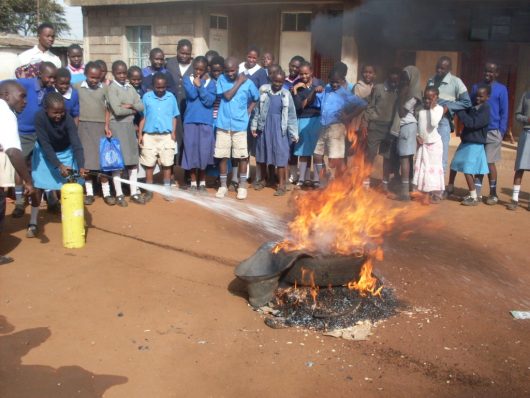New Smoke Detector Bolsters Fire Safety in Kenya

In the slum communities of Nairobi, Kenya, residents often lack basic protections from the risk of fire. Poor electrical wiring, risky cooking practices and poorly constructed housing create a deadly environment for the city’s poorest residents.
One technology company, Halo Smart Labs, has developed a smoke detector that can dramatically increase fire safety in Kenya, especially in the country’s urban fringe.
The poor neighborhoods that ring Kenya’s capital city are largely “informal” communities, built spontaneously and out of urgent necessity, with little to no concern given to potential hazards such as floods or fire. Electrical grids exist but are often temperamental and dangerous, with wires hanging loosely from casings; death by electrocution is not uncommon. Homes are constructed using cheap materials and cooking is often carried out using paraffin stoves with adulterated fuel.
2011 was a particularly devastating year, when an estimated 25,000 Kenyans were left homeless from blazes. All of 2014 and June of 2017 also saw major fires rip through communities.
A smoke detector system is desperately needed for Kenya’s urban slum dwellers – which led to the development of a device able to be installed in ill-equipped communities. Halo‘s technology allows an alarm to be placed in a home for minimal cost and without the need for a reliable electrical connection. An SMS feature also allows nearby residents and fire fighters themselves to receive instant updates on a developing situation.
The organization has partnered with the Kenyan Red Cross for the venture, which has already carried out a successful trial run. Company executives conducted site surveys, trained local administrators and oversaw initial testing. Combined with the Red Cross’s community connections and local expertise, the device has the capability to drastically improve fire safety in Kenya and its vulnerable urban centers.
Plans are currently underway to expand the rollout of the device. In terms of how many users the smoke detector could acquire, Halo has set an ambitious goal of one billion by 2025.
Even without reaching this lofty goal, Halo’s technological innovation can dramatically reduce the fire risks that too frequently come part-and-parcel of living in slum communities around the globe.
– Jonathan Riddick
Photo: Flickr
